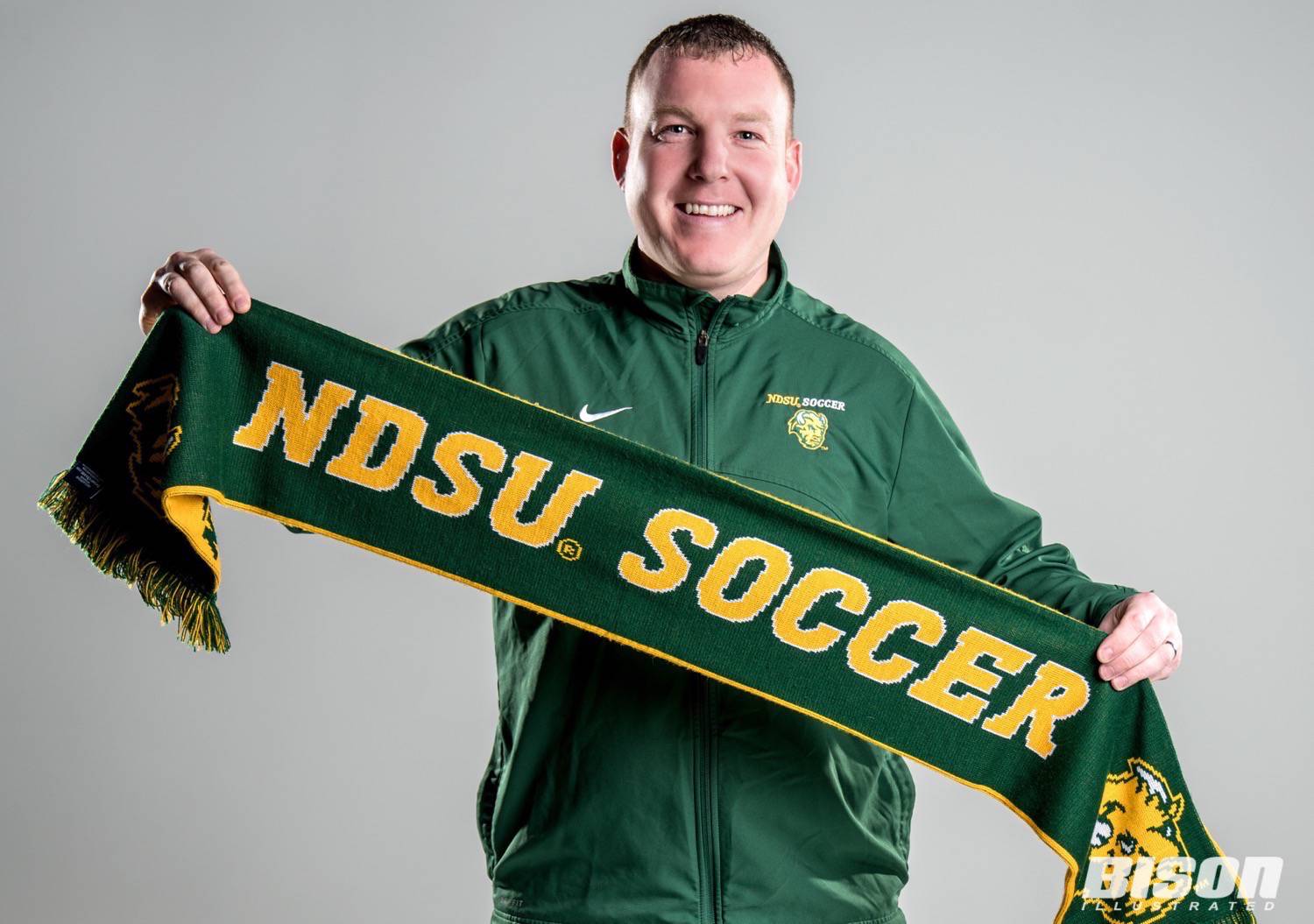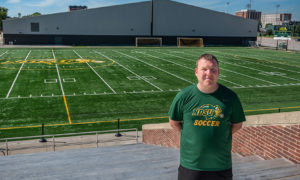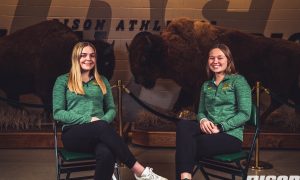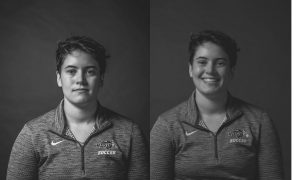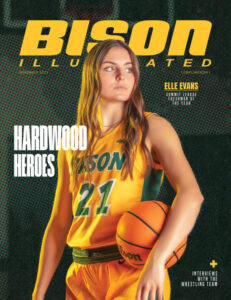Photos by Hillary Ehlen and Joe Kerlin
Mike Regan got his first coaching job before he could order a beer at an American bar. Shortly thereafter, he was the head coach. Regan spent his childhood ingrained in the youth system in England and has lived and breathed soccer since he could tie his own boots. Now, he’s ready to bring his passion and experience to Fargo as the new head coach for the Bison soccer team.
“From the outside looking in, they’re a major player and it is a forward-thinking athletic department (that) doesn’t want to stand still.” – Regan on why he took the NDSU job.
2005-06
North Iowa Area Community College, Assistant Coach
2007-11
North Iowa Area Community College, Head Coach
2009
Waldorf College, Bachelor’s degree – Wellness
2011
California University of Pennsylvania, Master’s degree – Sport and Fitness Administration/Management
2012-15
Drake University, Assistant Coach
2016-17
Indiana University, Assistant Coach
Quickies
Who’s your club?
My local club, Brentford FC.
Who’s going to win the champions league?
This is going to be a big shout, but I’m going to say Liverpool. I like (Jurgen) Klopp.
Best manager in football right now?
Pep (Guardiola). No doubt.
Preferred formation?
4-4-2
Why didn’t the US qualify for the World Cup?
There are a few layers to this. I think just one, if you look at the games, the performances just weren’t good enough (in the CONCACAF hexagonal qualifying round).
The Conversation
Bison Illustrated: When did you develop your love for soccer?
Mike Regan: “I started playing soccer when I was 5, and I just grew up in a big sports family. My dad was into horse racing and rugby, and football, or ‘soccer,’ was a big part of our family. My older brother played, my younger brother played so I had the opportunity to be around it every day and support the local club within Brentford that we still do today. The game was instilled in me at a young age. I was lucky enough to have some sort of talent to play. I played for a lot of professional youth teams growing up and tried to make it, so to speak. That’s when at Staines FC later on in my career. I played there at 19.”
Staines Town Football Club is an English football club based in Staines-upon-Thames, England, Regan’s hometown. Staines is more than 20 miles west of London.
BI: What’s it like playing for a youth academy in English soccer?
MR: “Monday through Friday, I would be in school and I would train a couple days a week, and then we would play on the weekends. What you’re trying to do from 13 onwards is you’re trying to get a professional contract from one of these clubs. I was lucky enough to be involved with a couple clubs but I never got over the line.”
BI: So you’re 19 and you’re playing with Staines. How did you get to the States?
MR: “There was a lot of, and there still are at the time, players coming over to the states to gain a scholarship or to get involved with coaching. Because of my background from back home, I wasn’t able to get through the NCAA eligibility clearinghouse (to play).”
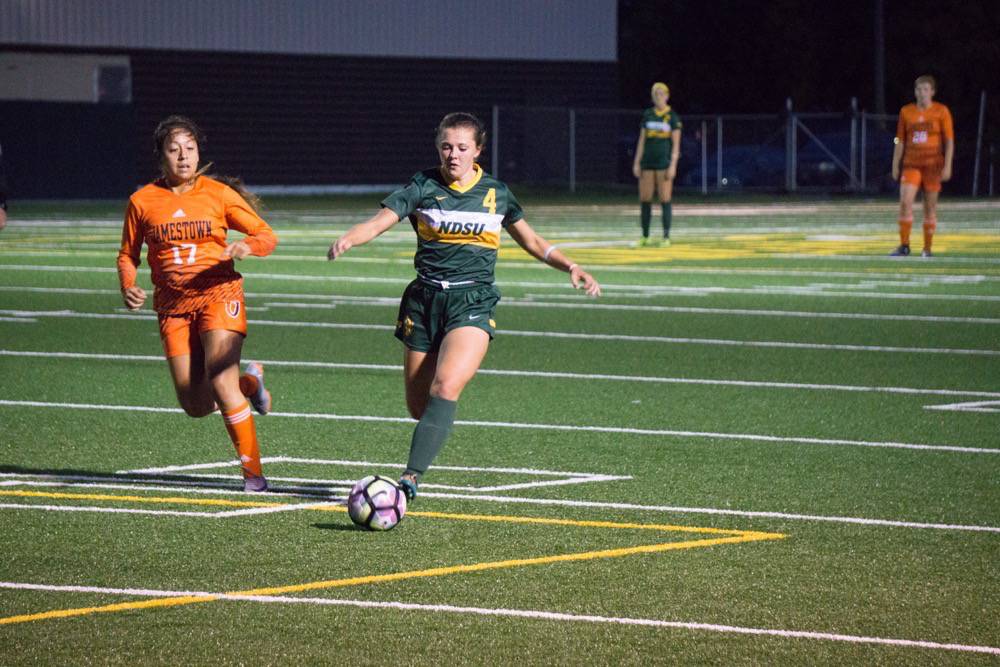
BI: Because you were being paid to play by Staines?
MR: “Yeah, just a small contract. At the time though, I was very naïve to the rules and those type of things so when coaches were asking me from different schools, ‘Hey, what’s your background? Where have you played? Have you been under contract?’ I obviously declared those things to them because I was being honest. Little did I know that it was a red flag, so from there, I had the opportunity to go to a small community college in the northern part of Iowa, and it was very much in the coaching capacity.”
BI: England to Iowa seems very random.
MR: “It was one of those things where someone reached out to me. He was a big mentor and is a great friend to me today, Colin Murphy, and I didn’t know where I was going. I didn’t know what was happening. My dad was very much like, ‘I think you should go. Go on this adventure. I think you should start your education.’
“Soccer had been such a focus for a long period of time with me trying to make it, and I didn’t, and you’re like, where’s Plan B? At the time, I was a bit reluctant to do it because I wanted to keep playing. In soccer terms, I was still very young. I always say: Iowa chose me more than I chose Iowa. I’m glad it worked out that way. I met my wife, made a family and I have a lot of good friends down there.”
Regan started as an assistant coach at North Iowa Area Community College when he was 20. Two years later, he was named the head coach when Murphy stepped down. In five years as the head coach, NIACC went 74-17-6.
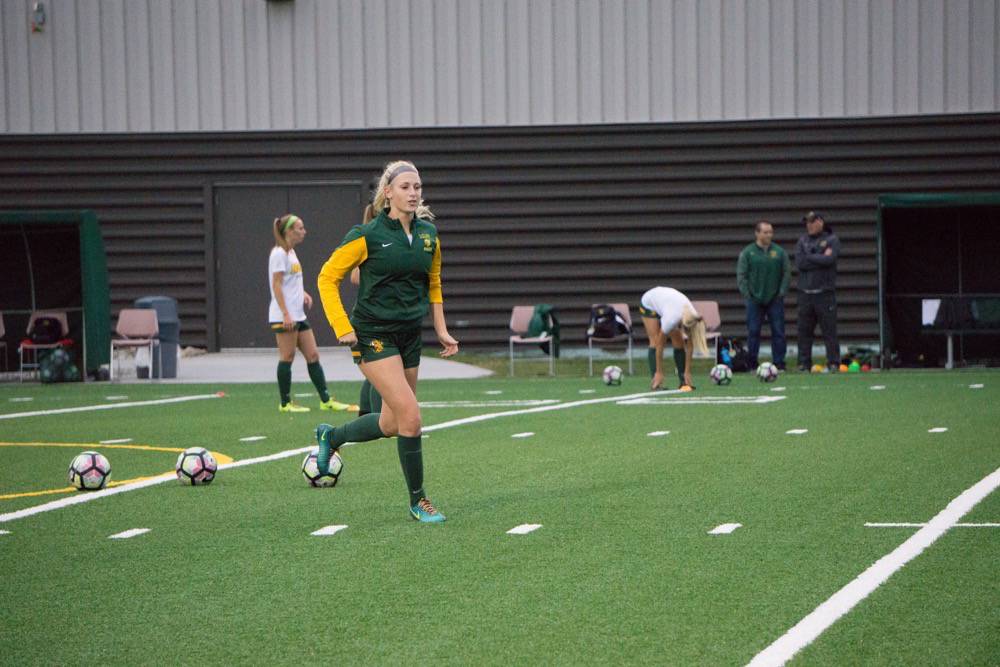
BI: You had a lot of success at the junior college level but you’ve always said you enjoy player development the most. What’s that all about?
MR: “I really enjoy taking a player that doesn’t know the qualities that they have and what it looks like, and getting them to do something that’s not in their wheelhouse so to speak. At the junior college level, the fun part of that job was, and I was on the men’s side at the junior college level, and we brought in a lot of players with ambition and fire to get to that next level, get to that four-year institution. So, what we’re able to do there is help young men in this instance academically, and help them get to that next scholarship opportunity. I think that’s where I become more zoned in on that development side as a player and as a person.
“That is something, even now with the girls here at NDSU, we’re really focusing on the strengths and deficiencies of each individual and how we look to improve them. Wherever I’ve been, it’s something I’ve loved to do, individually and collectively as a team.”
Regan holds a National ‘A’ Coaching License from the United States Soccer Federation. According to the figures sent to TopDrawerSoccer.com by US Soccer, there are currently about 2,500 soccer coaches in America who have earned the National A license.
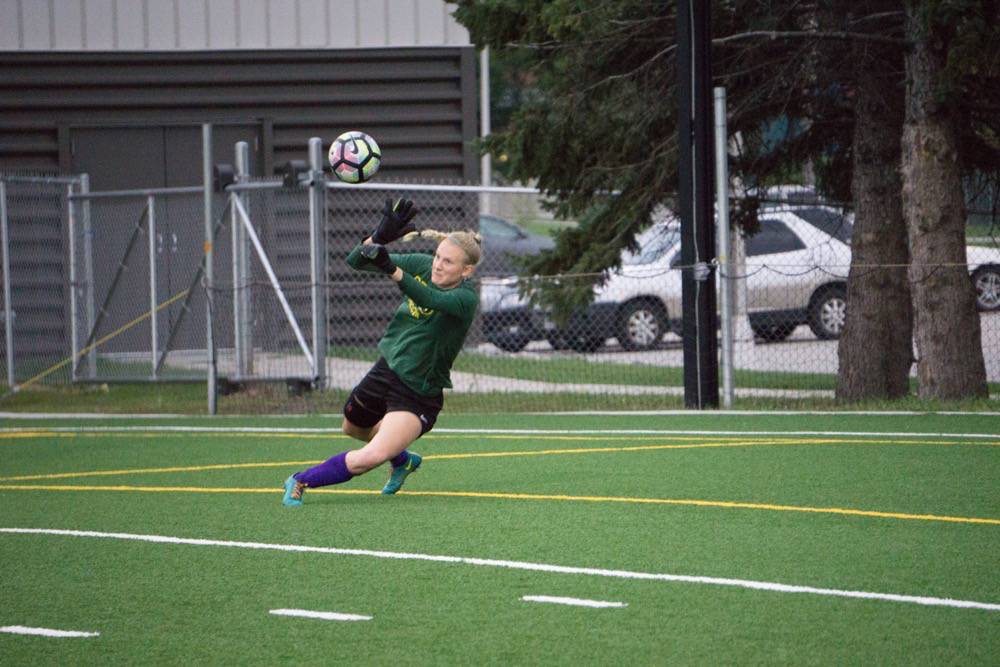
BI: What were some of the differences coaching the women’s game compared to the men’s game?
MR: “My first year at Drake, there was an adjustment period for sure. There’s always going to be sides of the game that the men bring with pace and intensity, maybe the physicality as well, but I think it took me a season to adjust at Drake and get used to the level and how they do things. The philosophy didn’t change. The way I approach the men compared to the women is the same. The same player development (strategies) were still there.
“I must say, I have really enjoyed the female side. I think you can develop a female player quicker. I think there’s more buy-in at times. You’re dealing with a sort of sponge instead of an ego that can be there on the men’s side. My time at Drake was terrific for me, for sure.”
Regan stayed in Iowa to become an assistant coach at Drake University for four seasons after his tenure at NIACC. He was on the staff that won the 2015 Missouri Valley Conference championship.
BI: After spending the last two seasons at Indiana, why is the NDSU head-coaching job the right fit for you?
MR: “When I was at Drake, I had a couple opportunities to move into other roles. The opportunity at Indiana, I felt, was the next step for me to see what it’s like at a big, big program and level, and work with the next level of player. Be more of a national recruiter instead of a regional recruiter. Just naturally at Drake, you’re recruiting the upper Midwest, and at Indiana, you’re all over the world.
“With this (NDSU) experience, I just felt like, from the outside looking in, they’re a major player and it’s a forward-thinking athletic department (that) doesn’t want to stand still. I always said if I got the opportunity to interview and stuff, I would. As a young coach, it’s tough to not be a part of a program like this where you have great facilities, great support, great community support, and so, it just matched up as well. From a family perspective, what a good opportunity to bring my family into this environment to enjoy it together.”
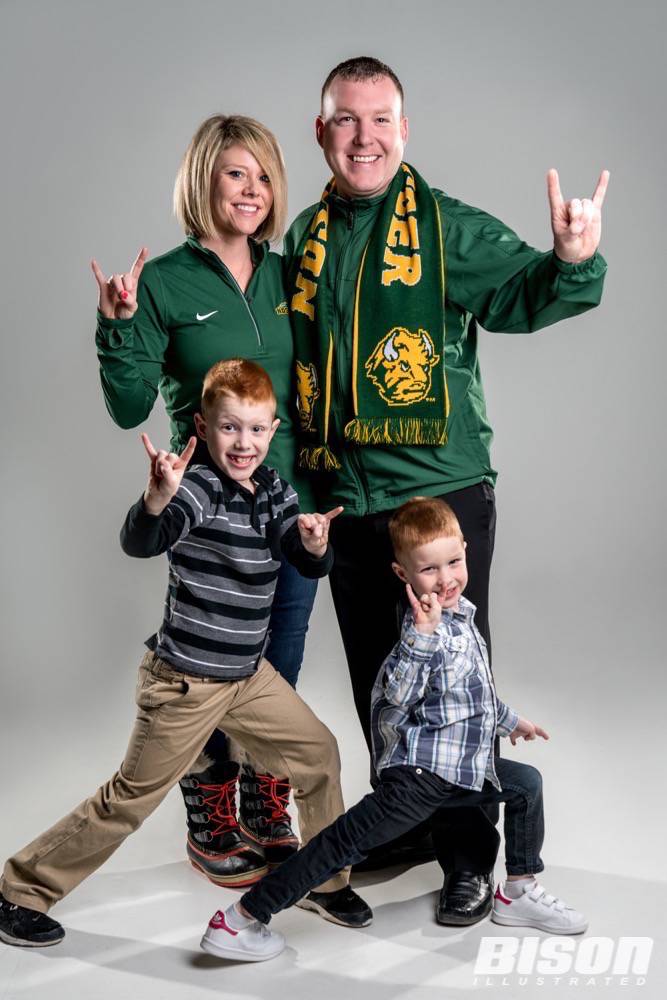
Regan met his wife Maradee in Iowa. They have two sons, Kieran (7) and Liam (4).
BI: Your boss and Director of Athletics Matt Larsen mentioned how high expectations are for the athletic programs at North Dakota State. How do you handle the expectations that come with being here at NDSU?
MR: “I think it’s about work ethic and honesty. Over time, I’ll be judged on wins and losses and championships and so forth, but I think that it’s very easy to get lost in sort of the long-term, ‘Hey, we’ve got to do this, this fall. This is what the plan is year two, year three.’
“I think we’ve got to get our head down, be honest within our work, set the expectations for the players of how this program needs to act, how we need to play, which is going to take some time. There is that expectation, and I think that’s the fun, challenging part of this. What I’ve learned over the last 13 years of coaching is, can I continue that, can I put that in place?
“I learned a long time ago that you can get lost in that expectation. It’s always going to be there. It’s always going to be in the back of your mind, but what we’re doing on a day-to-day basis, what intentionally are we doing in the program is going to be, at the end of the day, how successful we are.”

